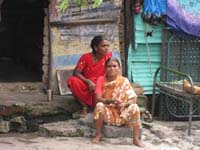Poor Countries Are Back-Strapped Against Breast Cancer
International cancer specialists meet this week to plan an assault on a troubling increase of breast cancer in developing countries, where nearly two-thirds of women aren't diagnosed until it has spread through their bodies.

Adding to the problem, some worrisome data suggests that breast cancer seems to strike women, on average, about 10 years younger in poor countries than it does in the U.S. No one knows why.
From Mexico to Malawi, stigma like Knaul witnessed a few weeks ago may prove as big a barrier as poverty.
"One of the trainers said, 'If he'd leave you for that, he's not worth having,'" Knaul says. But she acknowledged that will be a hard message for some women's economic realities.
Breast cancer long has been considered a cancer mostly of wealthier countries. Indeed, about 192,000 new cases are expected in the U.S. this year, where long-term survival is high thanks in part to good screening.
The true prevalence in most developing countries is unknown, because of poor diagnosis and bad record-keeping. But new Harvard research estimates they'll be home to 55 % of the world's 450,000 expected breast cancer deaths this year.
The report predicts the poorest countries will experience a 36 % jump in breast cancer by 2020.
One problem: In wealthy countries, earlier diagnosis can lead to breast-saving surgery instead of breast removal. Even countries like Rwanda and Malawi have clinics that perform mastectomies if patients can travel to the capitals, Shulman says. But few have radiation equipment, making breast-conserving surgery there not an option yet. (He is hunting a radiation unit for Rwanda but says that's in the very earliest stages of planning.)
Mexico is a mixed situation, with radiation, other treatments and diagnostic mammography available in some places. That's how Knaul — whose husband is a former health minister of Mexico — was diagnosed, early enough that mastectomy and chemotherapy give her good odds.
But she fumes that while Mexico's poor and rural women often get Pap smears to check for cervical cancer, "no one even suggests they check your breasts" at the same visit. She founded an advocacy group — Cancer de Mama — to help, noting that Mexico's insurance program for the poor covers breast cancer care but they must get diagnosed first.
The Associated Press has contributed to the report.
Subscribe to Pravda.Ru Telegram channel, Facebook, RSS!


